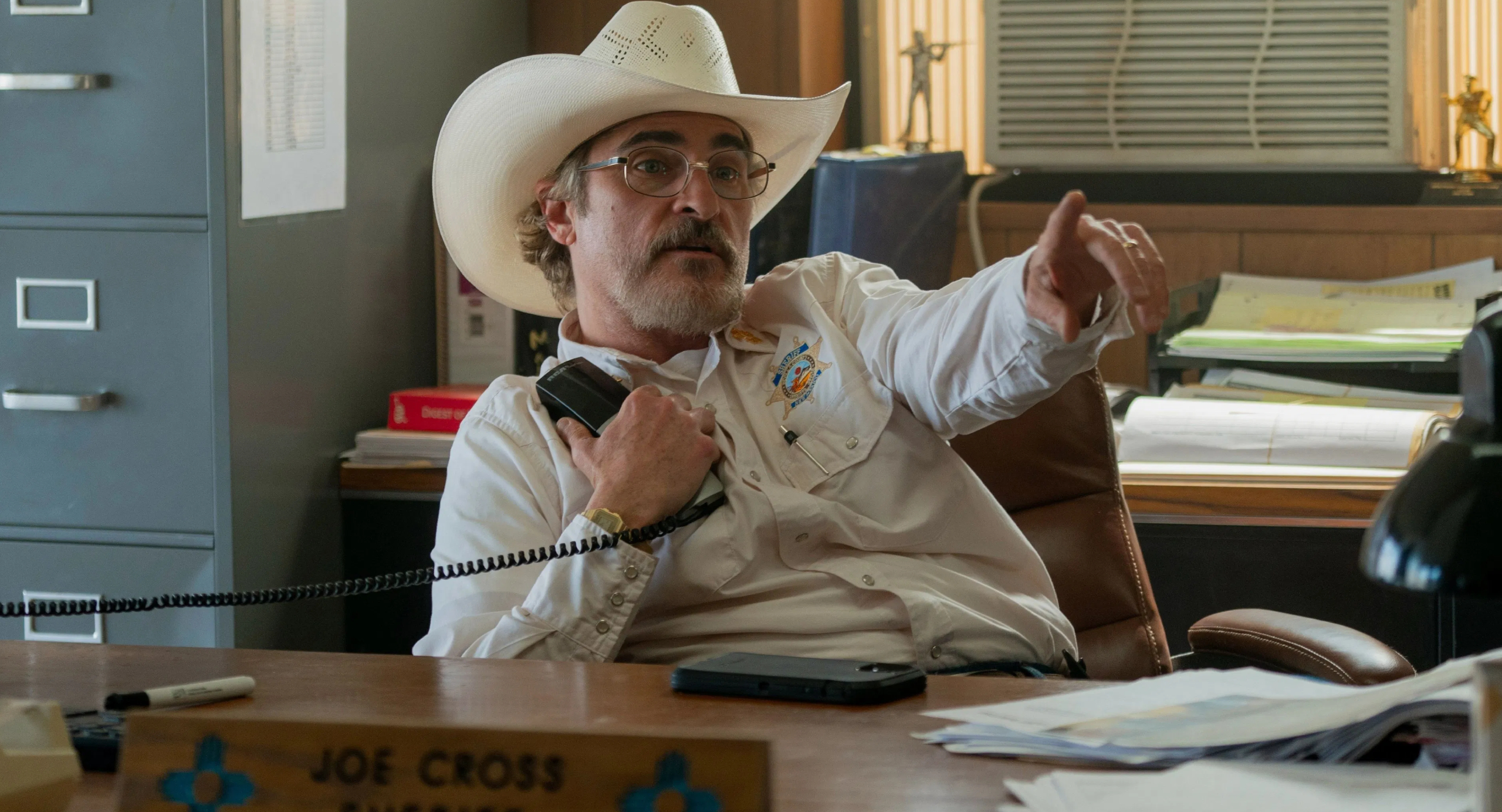Eddington – Film Review
Published July 15, 2025

Ari Aster’s Eddington is a wild and unclassifiable animal — a Neo-Western satirical black comedy shot through with the chaotic spirit of the COVID-19 pandemic and the slow rot of American idealism. Set against the dust-caked backdrop of Eddington, New Mexico in May 2020, the film draws a volatile line in the sand between two alpha males: Sheriff Joe Cross (Joaquin Phoenix), a volatile lawman running for mayor, and Ted Garcia (Pedro Pascal), the slick, opportunistic incumbent clinging to control. Their feud becomes a microcosm of the country’s political dysfunction, weaponized fear, and increasingly dangerous individualism. It’s part No Country for Old Men, part Dr. Strangelove, and part pandemic-era fever dream.
But for all its ambition and thematic heft, Eddington is also Ari Aster’s weakest effort to date. While his signature flourishes—blistering tension, dark humor, and explosive character work—remain intact, the film lacks the haunting cohesion of Hereditary and the mythic propulsion of Midsommar. Here, Aster trades psychological horror for sociopolitical absurdity, and the result is a movie that’s conceptually audacious but narratively scattershot. Even still though, a lesser effort from Aster is still a pretty entertaining movie.
Here, we follow Joe Cross, played with deranged weariness by Joaquin Phoenix. A stoic, rambling sheriff with a distrust of government and a taste for frontier justice, Joe finds himself increasingly radicalized in the early days of the pandemic. His opponent, Mayor Ted Garcia (Pedro Pascal), is an image-conscious bureaucrat whose attempts at public health enforcement — mask mandates, curfews, public announcements — draw the sheriff’s ire. Their ideological conflict escalates from terse town hall debates to acts of outright sabotage, all while the townsfolk choose sides, turn on neighbors, and lose sight of reality.
Phoenix delivers yet another mesmerizing performance — his Joe is both tragic and ridiculous, a man caught between cowboy mythology and modern impotence. He mutters conspiracy theories under his breath like scripture, scrawls campaign slogans on toilet paper, and engages in increasingly erratic behavior. Pascal, meanwhile, plays Garcia as a calculated charmer — oozing charisma but cracking under pressure as his re-election campaign collapses into farce. The two actors bounce off each other with barbed energy, and their rivalry becomes the film’s engine and allegory.
The supporting cast further enhances the surreal portrait of American collapse. Emma Stone, in a surprisingly understated turn, plays Joe’s long-suffering wife Louise, whose arc moves from stoic loyalty to moral reckoning. Austin Butler is massively entertaining as Vernon Jefferson Peak, a cult leader who weaponizes the chaos. He appears sporadically, but his scenes crackle with tension. Luke Grimes plays Officer Guy, a deputy who ends up getting some of the film’s best scenes.
As is expected at this point in an Aster project, the visuals here are stunning. Cinematographer Darius Khondji turns the sun-bleached vistas of New Mexico into both canvas and battleground. His lens evokes the dread of an incoming dust storm — everything looks slightly askew, as if reality itself is cracking under pressure.
Aster directs with controlled chaos, staging gunfights and campaign speeches with the same operatic intensity. His script, however, occasionally buckles under its own density. There are moments of piercing satire, but the film also wanders into indulgent monologues and half-baked subplots. Aster clearly has a lot to say about political identity, misinformation, and masculinity, but his messages get muddied in the scattershot delivery.
What makes Eddington feel more distant than his prior work is its lack of emotional anchor. In Hereditary, grief was the glue; in Midsommar, trauma and codependence were at the heart of the horror. Here, there’s no singular emotion or perspective grounding the absurdity. The satire is sharp but clinical, and while the characters are rich, their relationships are often sacrificed for the sake of commentary. The result is a film that’s intellectually engaging but emotionally cold — an op-ed come to life, rather than a lived-in story. There are unmistakable nods to the Coen Brothers throughout, especially in the way Aster plays with tone and regional dialects. The humor is dark — at times pitch black — and often hinges on how close to reality it all feels.
However, Eddington lacks the surgical precision of the best political satires. At 149 minutes, the film begins to sag under the weight of its own thesis. Several subplots feel extraneous, and the pacing becomes erratic in the final act.
Eddington is a bold, messy, and often hilarious descent into pandemic-era madness, refracted through Ari Aster’s singular lens. It’s a film that swings for the fences — and occasionally misses — but still manages to capture the disintegration of American life with bleak beauty. Joaquin Phoenix and Pedro Pascal give powerhouse performances that elevate the film’s satire, while the direction and visuals are frequently breathtaking.
However, the film’s lack of emotional cohesion and its overstuffed narrative keep it from reaching the haunting heights of Aster’s horror work. It’s a worthwhile, fascinating detour into dark comedy, but one that leaves you longing for the focused dread and psychological complexity of Hereditary or Midsommar.
Let’s hope Aster returns to the horror genre soon — Eddington proves he’s still one of the most distinctive voices in modern cinema, but his talents are most potent when they’re terrifying.
